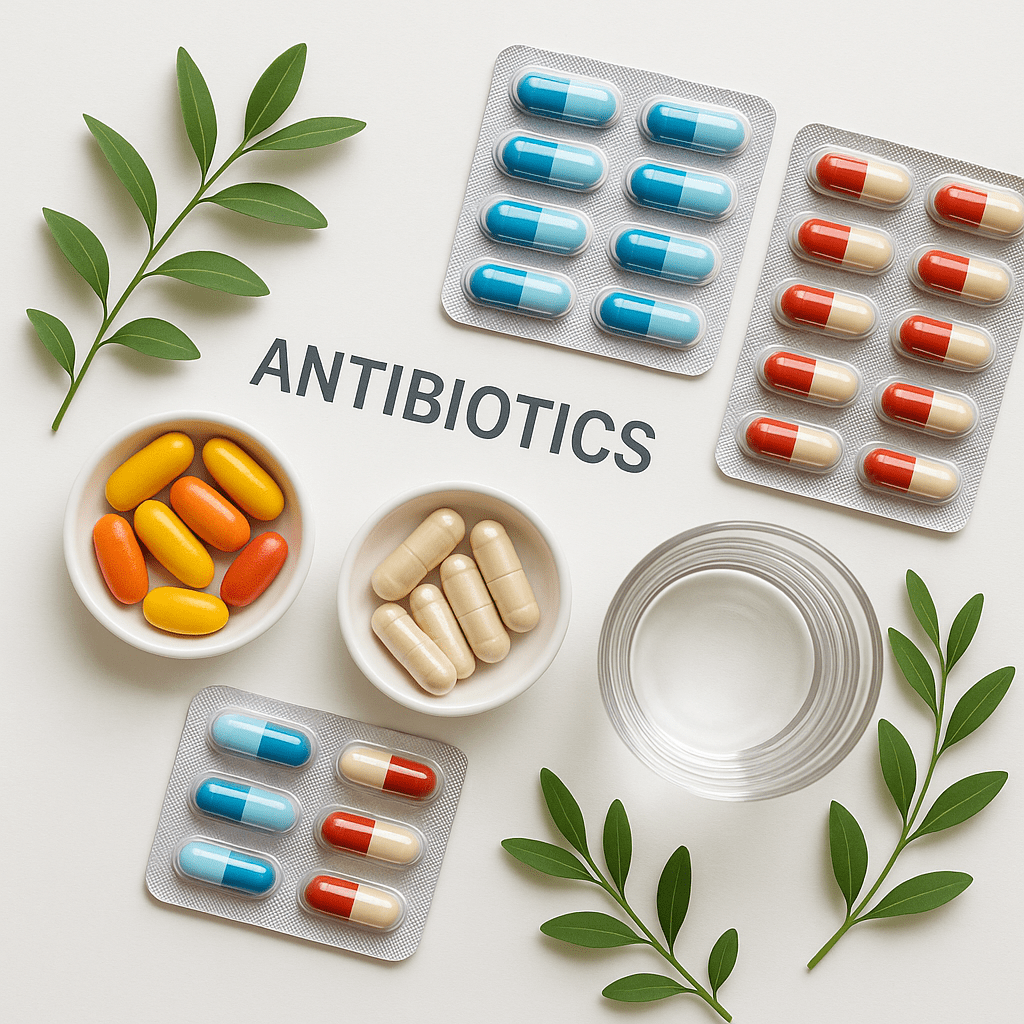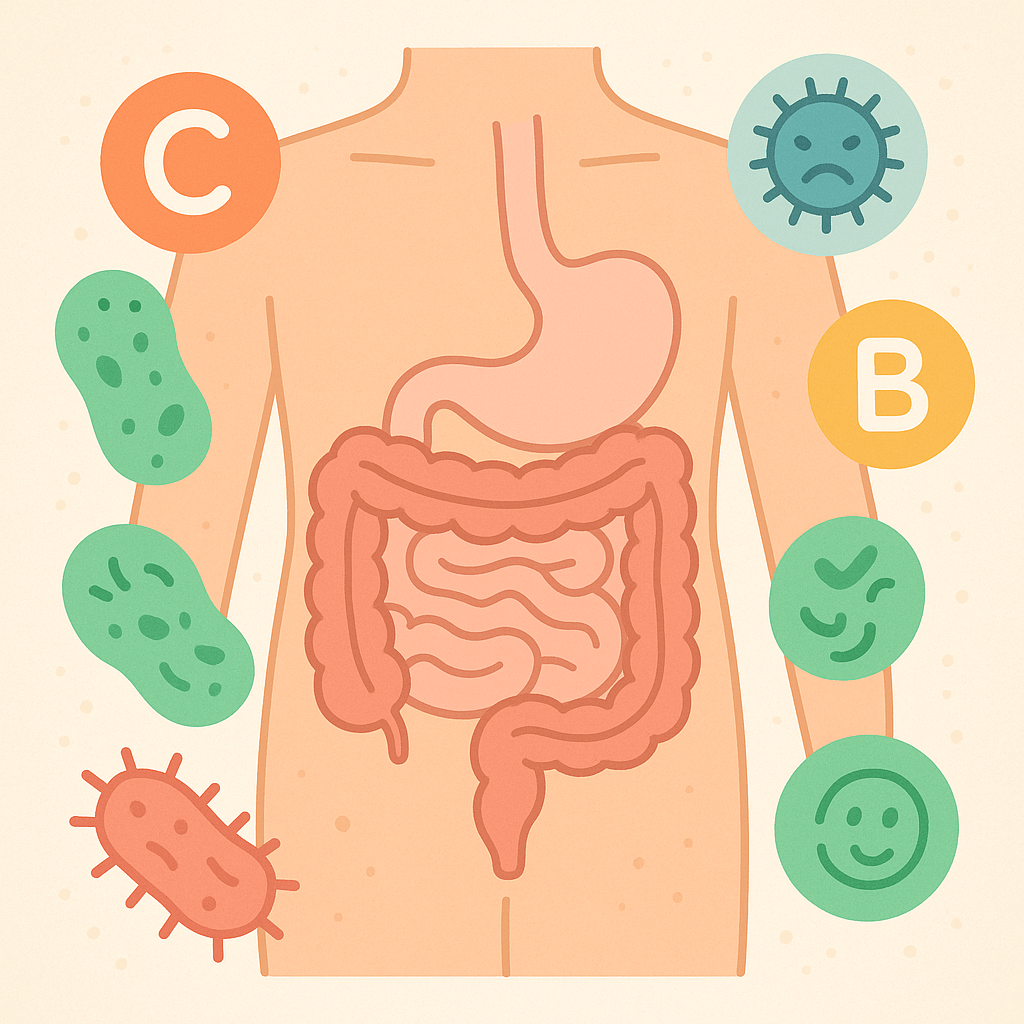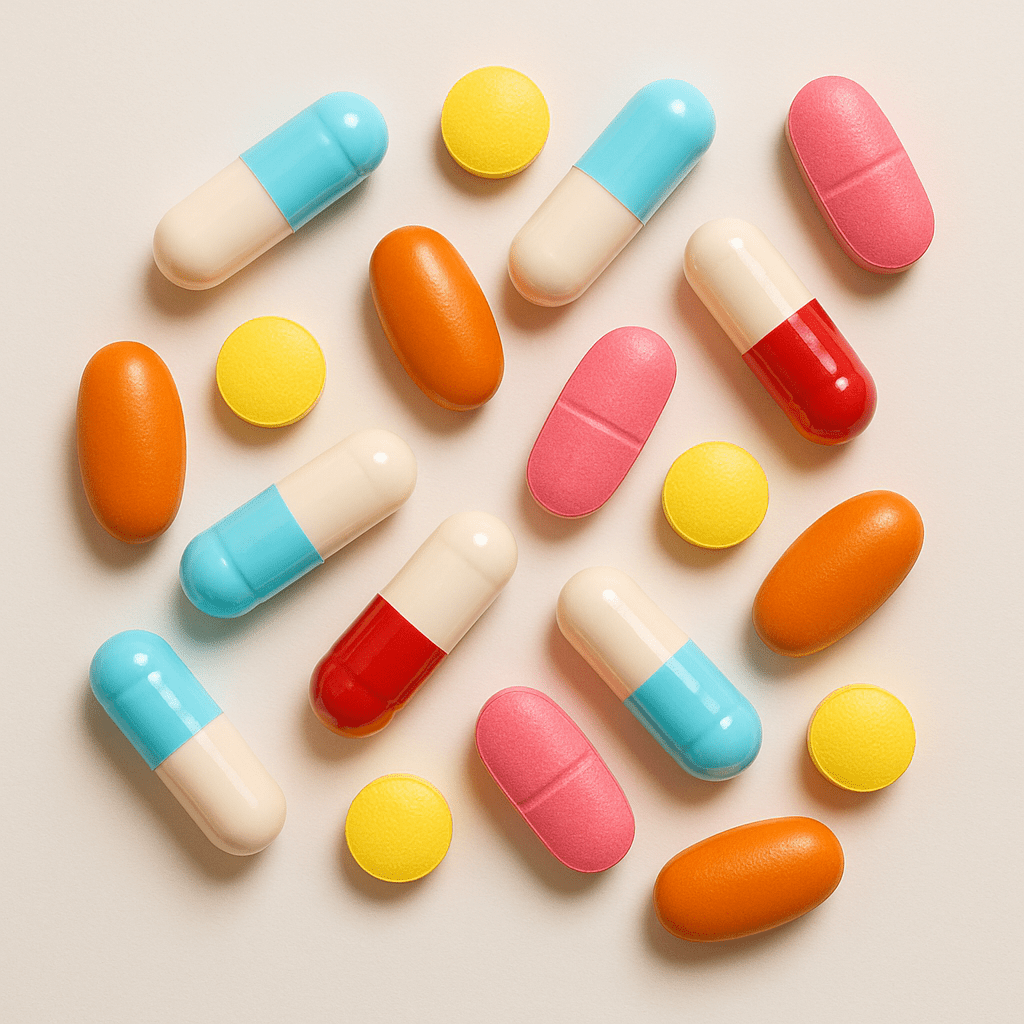Antibiotics are one of the main weapons in the fight against bacterial infections, but their effects on the body often raise questions about the use of supplements, especially vitamins and probiotics, during treatment. Antibiotics can affect the body’s ability to absorb certain nutrients and cause an imbalance in the intestinal microflora. Therefore, it is important to understand how to properly combine antibiotics with vitamins and other nutritional supplements.

In this article, you will learn how antibiotics interact with vitamins and minerals, how to best support your body during antibiotic use, and which nutritional supplements can help facilitate recovery and strengthen immunity after treatment. We will also discuss which vitamins and minerals should be avoided when taking antibiotics and how to properly space them in terms of time.
To learn more about digestive support and intestinal flora, you can visit the overview of natural dietary supplements for digestion.
How antibiotics affect the body and why vitamins are important
Antibiotics are effective in fighting bacterial infections, but at the same time they can disrupt the intestinal microflora, weaken the body’s natural defense systems, and sometimes cause unpleasant side effects. The most common side effects of antibiotics are diarrhea, fatigue, and impaired absorption of nutrients.
The intestinal microbiome is a complex ecosystem inhabited by trillions of microorganisms responsible for breaking down food, producing vitamins, and strengthening immunity. Antibiotics do not divide bacteria into “good” and “bad” – they act on a broad spectrum, destroying both pathogenic and beneficial microorganisms. This disrupts intestinal function and reduces the body’s ability to absorb certain vitamins and minerals.

Vitamins are especially important during this time because they help support immune function and help the body recover faster. For example, B vitamins are essential for energy production, while vitamin C strengthens the immune system and helps fight infection. However, it is important to know that not all vitamins and minerals can be taken with antibiotics – some can interfere with the absorption of antibiotics or be less well absorbed themselves.
Can you take vitamins with antibiotics: timing, safety and interactions
While many vitamins are safe to take with antibiotics, it is important to pay attention to the timing and type of their intake. Some minerals found in multivitamins (such as iron, calcium and magnesium) can reduce the absorption of antibiotics, thereby reducing the effectiveness of treatment.
Water-soluble vitamins, such as vitamin C and the B vitamins, usually do not pose a significant risk, but the absorption of fat-soluble vitamins (A, D, E, K) can sometimes be disrupted by taking certain antibiotics. To avoid negative interactions, vitamins and antibiotics should be taken at least 2 hours apart.
Tetracycline and fluoroquinolone antibiotics are particularly sensitive to interactions with minerals. These antibiotics form chelate complexes with divalent and trivalent cations (calcium, magnesium, iron, aluminum, zinc), which reduces the absorption and effectiveness of antibiotics. Therefore, it is recommended to take multivitamins, mineral supplements or foods rich in these minerals at least 2 hours before taking antibiotics or 4-6 hours after.
According to pharmaceutical specialists, some vitamins can even help reduce the side effects of antibiotics. For example, vitamin B6 can help reduce the neurological side effects of some antibiotics, and probiotics can reduce the risk of diarrhea.
When to be extra careful: drug-supplement interactions
Some classes of antibiotics (e.g., tetracyclines, fluoroquinolones) have well-documented interactions with minerals such as calcium, magnesium, zinc, and iron. These minerals are found in both food and multivitamin supplements. When taken together, they can bind to the drugs and reduce their effectiveness.
For example, doxycycline, minocycline, and other tetracycline antibiotics form insoluble complexes with calcium, magnesium, and other metal ions. These interactions can render up to 80% of the antibiotic dose unabsorbable. Therefore, dairy products, calcium supplements, and antacids should be avoided while taking these antibiotics.
Ciprofloxacin and other fluoroquinolone antibiotics also react with calcium, magnesium, aluminum, iron, and zinc. These interactions can reduce the antibiotic’s blood levels below therapeutic levels, which can result in untreated infections.
If you want to boost your immune system while taking antibiotics, check out new vitamin supplements and immune-boosting multivitamins—just be sure to time them correctly.
The Role of Probiotics: Protecting Gut Health During and After Antibiotics
One of the most popular supplements during antibiotic therapy is probiotics. These “good bacteria” help restore balance in the gut, which is often disrupted when antibiotics kill off both pathogenic and beneficial microorganisms. Clinical studies show that taking probiotics (such as strains of Bifidobacterium and Lactobacillus) along with antibiotics—but not at the same time—can reduce antibiotic-induced diarrhea and speed up intestinal recovery.
Probiotics work in several ways: they compete with pathogenic bacteria for nutrients and binding sites in the gut, they produce substances that inhibit the growth of pathogens, and they stimulate immune system function. However, it’s important to know that probiotics should be taken at least 2-3 hours after a dose of antibiotics so that the antibiotics don’t kill off the live bacteria in the probiotics.
Probiotics can be obtained from both supplements and food. Natural sources of probiotics include fermented dairy products (yogurt, kefir, sour milk), sauerkraut, kimchi, tempeh, and kombucha. Supplements may be beneficial for those who cannot consume enough probiotics through their diet, or for those who need specific strains of bacteria, especially after antibiotic therapy.
For more information on natural digestive support and probiotics, click here
Nutrition, Recovery, and Immune Support: An Antibiotic Recovery Plan
Nutrition plays a very important role during and after antibiotics. It is recommended to include whole grains, foods rich in vitamins C, D, and zinc in your diet, as well as enough fiber, especially after the end of treatment, to nourish the newly regenerating gut bacteria.
When vitamins are obtained from food, there is less risk of time conflict; however, when using supplements, it is important to take them a few hours after antibiotics for maximum effect. Studies show that proper nutrition can not only help reduce the side effects of antibiotics, but also speed up the recovery of the gut microbiome after treatment.
Here are some foods that are especially beneficial during antibiotic treatment:

- citrus fruits, kiwis, strawberries – sources of vitamin C, which strengthens immunity
- nuts, seeds, avocados – sources of fat-
- soluble vitamins and healthy fats
- green leafy vegetables – sources of folic
- acid and other B vitamins
- fermented products – natural probiotics
- garlic, onion family vegetables – prebiotics,
- which help feed good bacteria
- fatty fish – sources of omega-3 fatty acids, which reduce inflammation
If you are interested in convenient options for vitamin supplements, vitaminized gummies can make them easier to take – they are great for both children and adults.
Don’t forget to hydrate – drinking plenty of water helps eliminate toxins and supports gut health. Sufficient rest and stress management are also very important, as stress can weaken the immune system and slow down the body’s healing processes.

It is important to allow your body to fully recover after a course of antibiotics. This can take anywhere from a few weeks to a few months, depending on the type and duration of antibiotics used. If symptoms such as digestive problems, fatigue, or recurring infections persist after treatment, it is important to consult a doctor.
Conclusions and next steps
Combining antibiotics and vitamins is generally safe, but it is important to pay attention to the timing and type of use to maximize the benefits of treatment and the body’s recovery. Proper timing of supplements, attention to mineral interactions, taking probiotics, and eating a nutritious diet all help to support gut health and immunity.
Key recommendations to remember:
- Take mineral supplements (especially calcium, magnesium, iron, zinc) at least 2 hours before or 4-6 hours after your antibiotic dose
- Take probiotics at least 2-3 hours after your antibiotics
- Avoid alcohol, grapefruit products, and large amounts of mineral-rich foods while taking antibiotics if you are taking them at the same time as your antibiotics
- Drink plenty of water to help your body flush out toxins
- Enrich your diet with prebiotics and probiotics after a course of antibiotics to help restore your gut flora
If in doubt, always consult your doctor or pharmacist to personalize your regimen for safe and optimal results. You can learn more about your supplement options by reviewing popular natural supplements designed to work in harmony with your body’s natural processes.
Frequently Asked Questions (FAQ)
1. Can you take antibiotics and vitamins at the same time?
Generally yes, but avoid taking mineral supplements (such as calcium, magnesium, iron or zinc) with certain antibiotics – separate doses by at least 2 hours.
2. What vitamins should I take during a course of antibiotics to help my body recover?
Vitamins C, D, B complex and zinc can support the immune system; probiotics help restore the gut flora. Make sure to time them correctly to get the most benefit.
3. Is it necessary to take probiotics during a course of antibiotics?
Probiotics can reduce digestive side effects and speed up the recovery of the gut, but take them at least 2-3 hours after a dose of antibiotics.
4. What foods are best to eat during a course of antibiotics?
Choose fresh fruits, vegetables, lean proteins, and fermented foods like yogurt and kefir. Increase your fiber intake after you finish your antibiotic treatment.
5. What should you avoid during antibiotic treatment?
Avoid alcohol, grapefruit products, and supplemental forms of calcium, magnesium, or iron that coincide with antibiotic doses to avoid decreased effectiveness.

